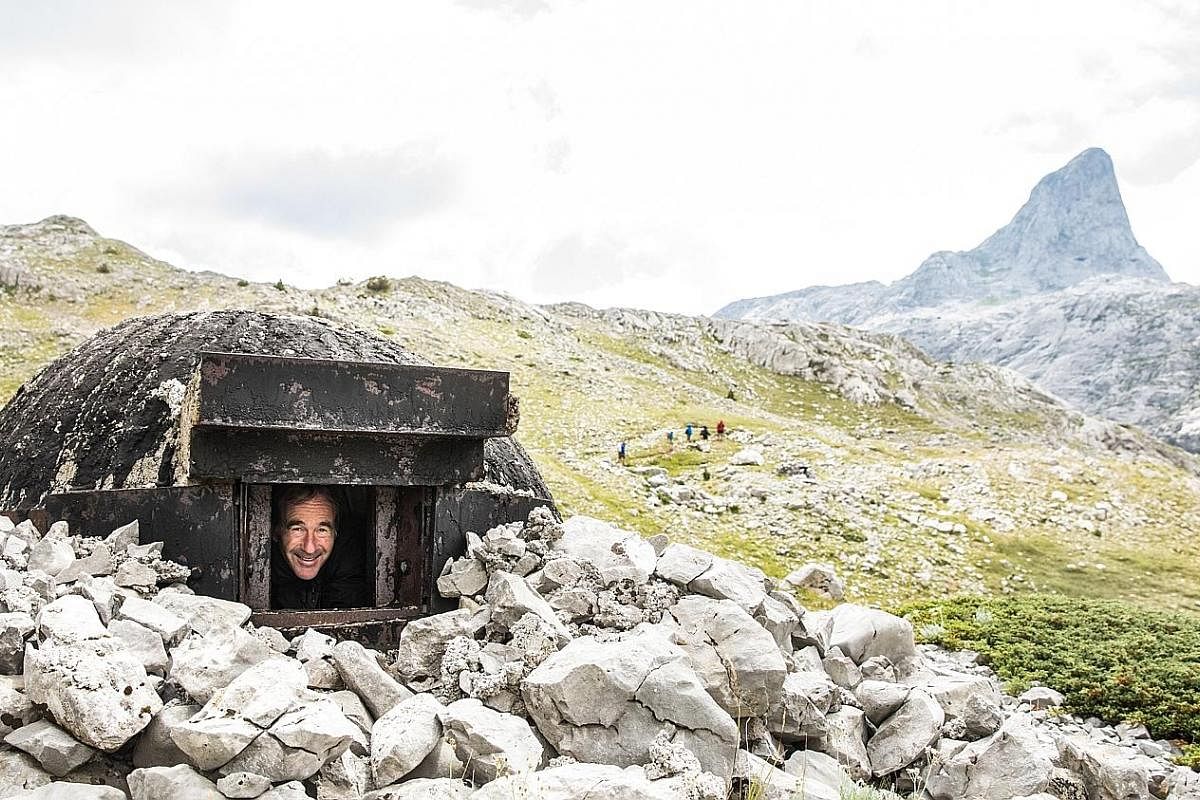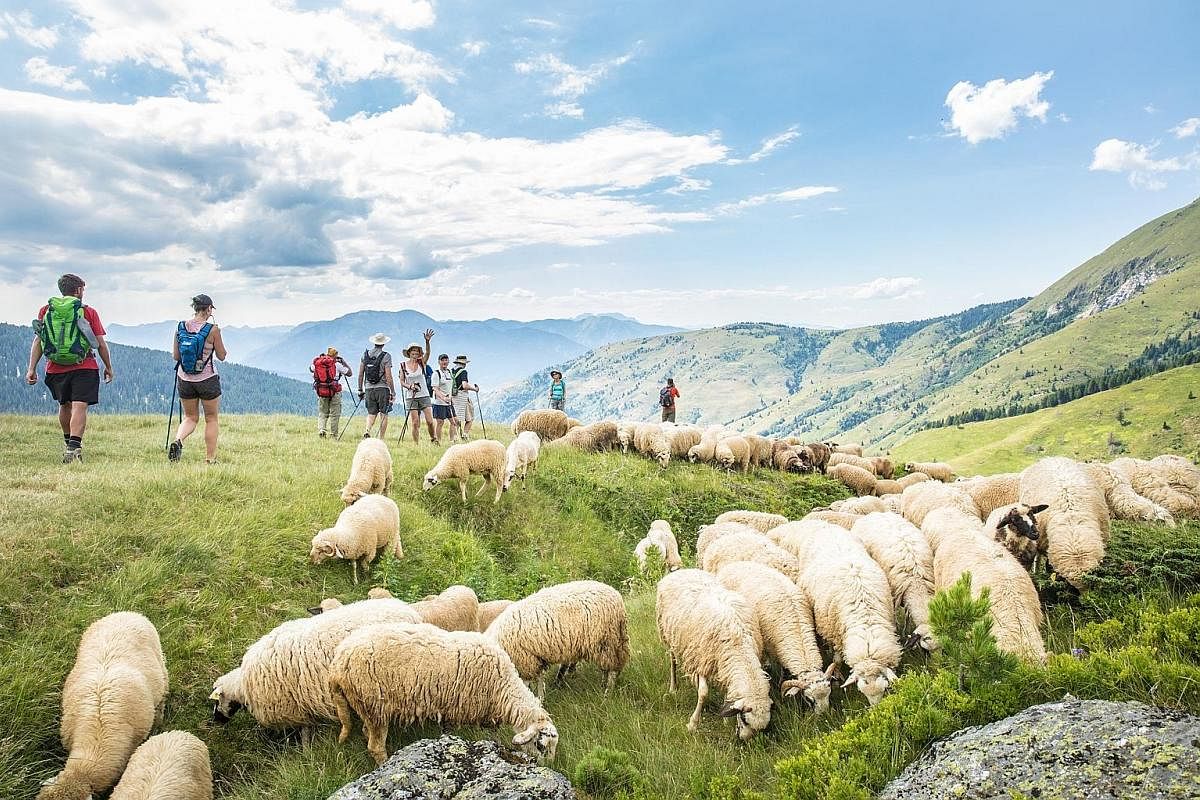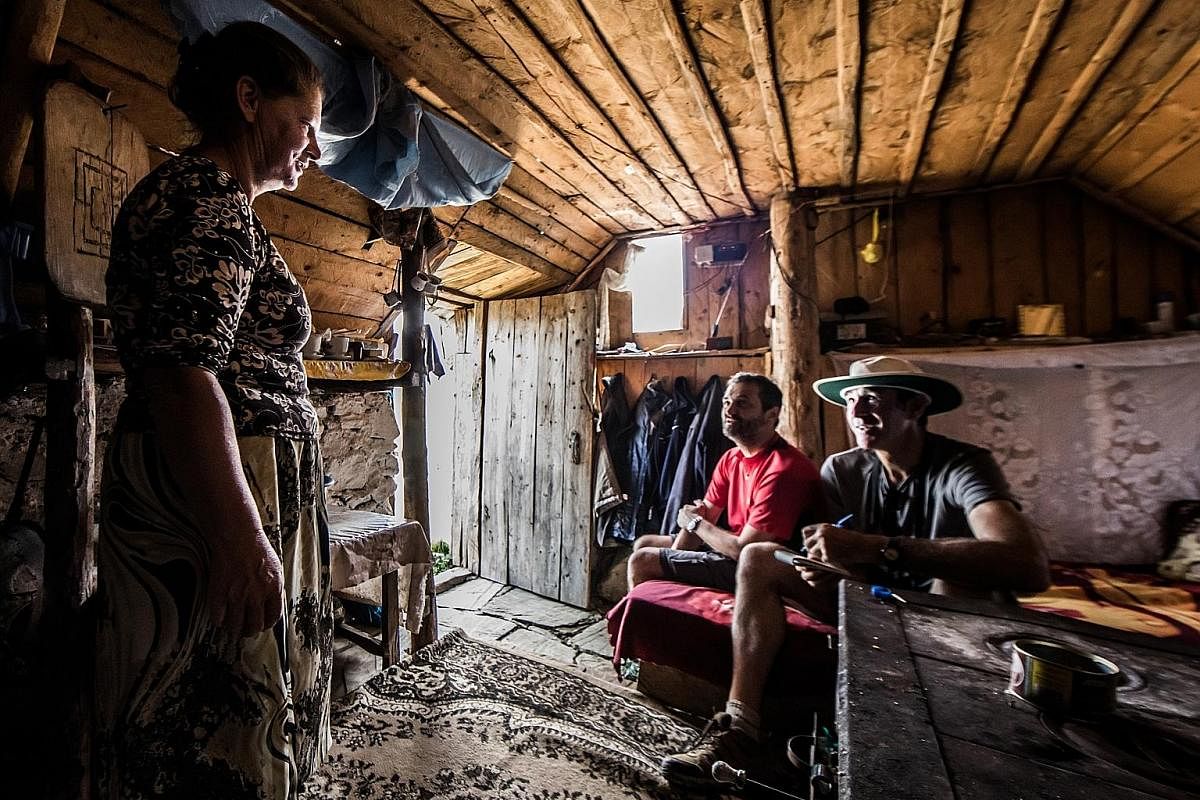-
GETTING THERE
-
Singapore Airlines (www.singaporeair.com) flies daily to Istanbul in Turkey, where Turkish Airlines (www.turkishairlines.com) has onward flights to a trio of Balkan capitals where treks to the Accursed Mountains can start.
The trek organiser, Balkan Natural Adventure (www.bnadventure.com), picks up travellers from the airports of Podgorica in Montenegro, Pristina in Kosovo or Tirana in Albania.
The company can customise treks. A 10-day trek, for instance, costs about US$1,200 (S$1,630), depending on the size of the group. That price includes all accommodation, meals, transfers and English-speaking guides, but not flights.
-
TRAVEL TIPS
• The best time to go is from May to September. Temperatures will be scorching on the plains, but perfect in the mountains.
• The hikes are roughly 19km a day, but involve some steep climbs and descents, so a reasonable level of fitness is required.
• Bring good walking boots, trekking poles, a sun hat, sunscreen, sunglasses and water bottles. Your luggage is transported by horse or van, but you will need a small backpack during the day for a picnic lunch and water.
• Read Broken April by Ismail Kadare; The Accursed Mountains by Robert Carver; and Land Of Eagles by Robin Hanbury-Tenison.
A mountain trek through time
In the Balkans, marvel at majestic scenery and stumble upon bits of Cold War history in the Accursed Mountains, where ancient pastoral traditions have survived decades of war and dictatorship



We penetrated the Accursed Mountains in the Balkans by water. From northern Albania, a long, thin, canopied motor launch of some antiquity conveyed us for two hours up Lake Koman - a deep and labyrinthine gorge with towering walls of rock.
It was dark by the time the boat landed our group of nine friends and family members at the far end. Using torches, we clambered up a steep path to a waiting minibus.
Another 90 minutes of rough road later, we reached the village of Valbona, where a magnificently mustachioed farmer named Kol Gjoni welcomed us into his home.
It was not until we awoke the next morning that we realised we had reached some sort of paradise. Gjoni's old stone farmhouse is surrounded by snow-flecked mountains, their peaks set aflame by the rising sun.
We ate breakfast outside - home-made bread, salty white goats' cheese and jams and curds with tomatoes and cucumbers straight from his fecund vegetable garden.
An hour later, we were hiking up through lush meadows and a forest towards Albania's border with Montenegro, our baggage following on horseback.
That was the start of an eight-day trek that would take us through some of the most majestic and unspoilt scenery left in Europe, and deep into a remote, inaccessible pocket of the Balkans.
Here, leathery-skinned shepherds and goatherds still tend their flocks in the high mountain pastures, and ancient pastoral traditions have survived decades of war and dictatorship.
Here, too, traces still survive of a 400-year-old code of conduct named the Kanun that sanctions honour killings, but mandates that travellers are treated as honoured guests.
LONELY BORDERS, PASTORAL LIFE
It was the name - the Accursed Mountains - that had attracted my attention. I looked them up and found that the mountains spanned the borders of Albania, Montenegro and Kosovo.
I also discovered that in 2012, a German agency had created a 193km "Peaks of the Balkans" trail through them to attract tourists and bring together the historically fractious Muslim, Christian and Orthodox communities along the route.
I resolved to walk not all of it, but at least the choicest stretches. I roped in friends and family and flew out to the diminutive Montenegrin capital of Podgorica. It proved to be an adventure that far exceeded any of our expectations.
That first day, we climbed to a pass where Albania's border with Montenegro is marked by a single crumbling concrete post and ambled across.
That border would have been forbidden territory during the four decades from 1945 that Enver Hoxha, Albania's communist dictator, turned his country into Europe's equivalent of North Korea. Anyone trying to cross it would have been shot on sight.
A couple of hours later, we reached a cluster of rough stone huts with wood-tiled roofs clinging precariously to a steep hillside - the only settlement we passed all day.
The inhabitants were shepherds who bring their livestock up here each summer. They gave us oregano tea and warm sheep's milk, and an elderly woman named Qamile Mulkurtaj told us about the Kanun.
The code is far more important to her than any law passed in the distant Albanian capital of Tirana, she said. The blood feuds and honour killings that it sanctions still happen occasionally, she added.
And she gave her daughter's husband a bullet when they married to show she was placing her life in his hands. "That's how it should be," she declared.
That evening, we reached Doberdol, a collection of stockaded shepherds' huts randomly scattered across the floor of a vast green bowl of a valley.
We stayed in the home of Bashkin Memija, a former Albanian army chef, who killed a lamb in our honour. We drank cold beers as he and his wife chopped the animal up.
We watched the villagers bringing in their livestock for the night and feasted on bean soup, spinach and onion pie, cornbread, cheeses, roasted peppers and two great platters of roasted lamb - head and sweetmeats included.
Fortified by Memija's fiery plum raki, we retired to two wooden huts that serve as dormitories. I awoke just once, when three gunshots set all the dogs in the valley barking. Wolves, Memija explained in the morning.
And so our trek went on. We walked about a dozen miles a day in glorious sunshine and the purest air. We climbed two mountains over 2,400m, including Gjeravica, the highest peak in Kosovo.
We negotiated long narrow saddles between sublime valleys. We ambled through forests of beech, oak and pine - the lairs of bear, lynx and wild boar.
We swam in turquoise lakes, crossed mountain streams on rickety log bridges and filled our water bottles from ice-cold springs. We picnicked in Alpine meadows full of bees, butterflies and colourful wildflowers.
We followed our two splendid guides along paths used for centuries by traders, shepherds and - more recently - arms smugglers and refugees. We scarcely met any other hikers, just occasional walnut-coloured herdsmen or women whose presence was signalled by the tinkling of cowbells or the sound of them singing to their flocks.
Lower down, in the valleys, we watched whole families scything their meadows by hand, as their ancestors had done for centuries, and piling the grass onto dome-shaped haystacks with pitchforks.
We stayed with the villagers. Their guesthouses are basic but clean. They cooked on wood-fired stoves and fed us with meats, cheeses, eggs, vegetables, fruit and raki that they themselves produced and for which they charged a pittance.
Their remarkable hospitality is another legacy of the Kanun.
"The person who eats my food or drinks my water is like my brother," said Musa Krasniqi, our host in the Kosovan village of Gropa Erenikut and a colonel in the Kosovo Liberation Army during the war of 1998 to 1999.
Memories of that conflict are still fresh. Villages such as Gropa Erenikut were destroyed by the Serb army and subsequently rebuilt.
Almost all the Albanian Kosovans we met had stories to tell - of fleeing through the mountains, smuggling arms and clearing mines.
We passed graveyards full of Kosovo Liberation Army soldiers and victims of Serb ethnic cleansing.
One morning, we visited the Orthodox Christian monastery of Decani, a Unesco World Heritage Site in the foothills that boasts a Romanesque jewel of a church decorated from floor to ceiling with ancient frescoes.
During the war, the monks offered refuge to Muslim refugees, but that has not spared it. It has been attacked several times by Albanian extremists and even today - nearly two decades after the war ended - it is guarded by well-armed Nato troops.
But it is, of course, the war - and, before that, Hoxha's long dictatorship - that spared the Accursed Mountains the ravages of mass tourism.
KEEPING THE MOUNTAINS ALIVE
I never did discover where that name came from. Some attributed it to the travails of long-forgotten armies who found the mountains blocking their routes north or south, others to the forbidding and impenetrable nature of the range. To judge from our final day, I favour the latter explanation.
Our route took us up the mighty Ropojana Valley from Montenegro to Albania. The weather had changed and dark clouds hid the sun. The valley narrowed as we climbed, funnelling the cold wind. Vegetation disappeared, great ramparts of sheer rock rose on either side of us and mist swirled around the serrated mountain tops.
Finally, at 1,700m, we reached the pass that marked the border. There, well camouflaged in the barren, lunar landscape, we found no fewer than seven pillboxes, some partially destroyed and others with their concrete domes still intact, all with commanding views of the valley we had just climbed up. Just behind them were long-abandoned military barracks.
I was amazed. Hoxha was convinced the world wanted to invade Albania. He built these and countless other pillboxes to defend the borders of his country. They are authentic bits of Cold War history left to crumble in this bleak and lonely mountain pass.
Beyond, we descended 900m on a precipitous switchback path into the beautiful valley of Theth and came to rest in another delightful guesthouse run by two brothers, Pavlin and Nardi Polia.
We spent our final 24 hours in the valley, hiking up to a spectacular waterfall, swimming in a tiny (and freezing) gem of a natural pool and inspecting a windowless, 400-yearold tower called a kulla.
There, under the Kanun, targets of revenge killings were allowed to take refuge - for years if necessary.
Pavlin Polia told me that the first hikers arrived in the valley only eight or nine years ago, but that more have been coming every year. I expressed concern that they would destroy the traditions and solitude that make the Accursed Mountains so special.
On the contrary, he replied.
The hikers stay in the villagers' homes. They create a market for the shepherds' and farmers' produce. They are "keeping the mountains alive", he said.
• Martin Fletcher is a former foreign and associate editor of The Times of London.
Join ST's Telegram channel and get the latest breaking news delivered to you.
A version of this article appeared in the print edition of The Sunday Times on October 29, 2017, with the headline A mountain trek through time. Subscribe

